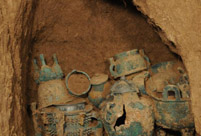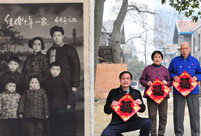BEIJING, Feb. 26 (Xinhuanet) -- China's proposal to establish a national memorial day for those who died during the Nanjing Massacre in 1937 and a commemorative day for victory in the War of Resistance Against Japanese Aggression (1937-45) is an unequivocal demonstration of its resolve to safeguard regional and world peace.
It serves as a reminder to the far-right forces in Japan, ahead of global activities to celebrate the 70th anniversary of victory in the anti-fascist war, that history should not be forgotten.
The brutalities committed by the Japanese invaders left a lasting scar in the hearts of the Chinese people. Tens of millions of Chinese people were killed, including the more than 300,000 people that were brutally slaughtered in the Nanjing Massacre in 1937. Japanese troops also conducted lethal biochemical experiments on live Chinese captives and committed numerous acts of rape and other appalling atrocities. The war, meanwhile, testifies to the perseverance and unyieldingness of the Chinese people in safeguarding sovereignty, territorial integrity and national dignity.
So the proposal by the Standing Committee of the National People's Congress also illustrates China's determination to safeguard its national interests and world peace when Japanese far-rightists repeatedly attempt to whitewash their history and deny the results of trials by the International Military Tribunal for the Far East.
It is natural for countries to have memorial days and for China, one of the most seriously victimized countries during World War II, the two days will be a show of respect and mourning for the victims and a reminder of the necessity of building up its national strength.
Such a necessity is not unfounded.
The far-right forces in Japan have never ceased to deny the historical facts. As a sign of that blind stubbornness, Japanese Prime Minister Shinzo Abe visited the Yasukuni Shrine, which honors 14 Class-A war criminals convicted in the Tokyo Trials, in December.
Its fact-distorting history textbooks, which omit its war atrocities, have also aroused great concern in the international community. Moreover, Japanese politicians are trying to break the decades-old non-nuclear principles, and Japan has hoarded nuclear materials — including massive amounts of weapons-grade plutonium — that pose a threat to regional peace.
All countries in the region and beyond need heightened awareness that militarism could be revived in Japan if they fail to keep it at bay.
 Chinese Dream: the Chinese Spirit and the Chinese Way
Chinese Dream: the Chinese Spirit and the Chinese Way 51 bronze sacrificial utensils unearthed in Shaanxi
51 bronze sacrificial utensils unearthed in Shaanxi Most gorgeous female celebs in Chi-pao
Most gorgeous female celebs in Chi-pao Second round of test kicks off at Beijing Film Academy
Second round of test kicks off at Beijing Film Academy Ancient Qiang people had vertically grown teeth
Ancient Qiang people had vertically grown teeth Top 10 Chinese youth’s favorite seaside destinations
Top 10 Chinese youth’s favorite seaside destinations Traditional Tibetan clothing tailors
Traditional Tibetan clothing tailors In photos: Unveiling Taishan station
In photos: Unveiling Taishan station Beautiful moments of family reunion
Beautiful moments of family reunion Chinese warplanes C919 to appear at Singapore Airshow
Chinese warplanes C919 to appear at Singapore Airshow Ruins of Shang Dynasty's structure unearthed in Shaanxi
Ruins of Shang Dynasty's structure unearthed in Shaanxi  Intercity high speed train in operation
Intercity high speed train in operation Severe coldness freezes large parts of China
Severe coldness freezes large parts of China  Beautiful moments of Sochi
Beautiful moments of Sochi  It's not just performing this year
It's not just performing this yearDay|Week|Month